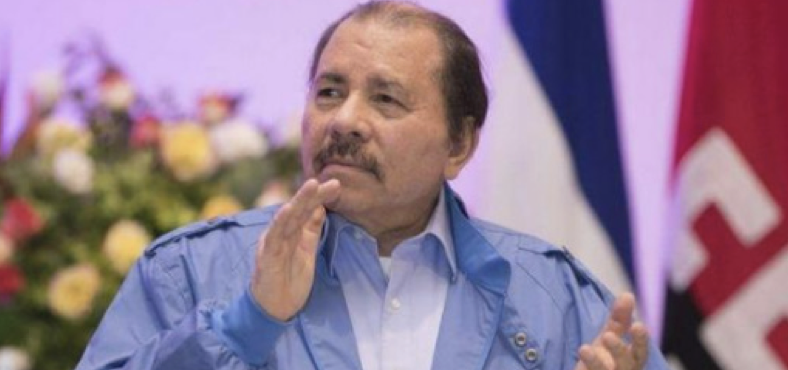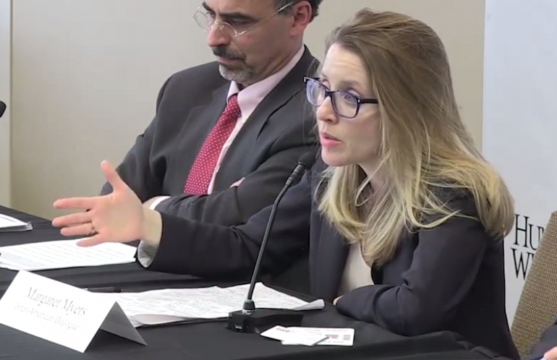A Fatal Blow to Democracy
Nicaragua is on the precipice.
A Daily Publication of The Dialogue
Nicaragua will hold its presidential elections on Sunday. The vote has been widely denounced as rigged as the government of President Daniel Ortega, who is seeking a fourth consecutive term, in recent months has imprisoned or pushed into exile virtually anyone who could mount a serious challenge against him. What will Ortega’s expected victory mean for Nicaraguans in the coming years, and how will the country be affected? How likely is the international community to respond with increased political and financial pressure on the Ortega administration following the elections? What are the prospects for social unrest of the magnitude of the 2018 protests in Nicaragua?
Lucía Pineda Ubau, journalist at 100% Noticias in Nicaragua and winner of the International Women’s Media Foundation 2019 Courage in Journalism Award: “Every day that Daniel Ortega and Rosario Murillo are in power, they hurt the people of Nicaragua. Without freedom there is no democracy. They intend to continue with the Cuban model, imprisoning all of Nicaragua. Without freedom, there can be no generation of jobs; with dictatorship, businesses close and people are forced into exile, not only because of repression but also due to economic reasons. With Ortega and Murillo, there is no future for Nicaragua; rather they regressed by rejecting the path of democracy. They bet on repression to sustain power. They won’t consider leaving power because it would mean jail for them. Ortega announced a dialogue, but it will be yet another farce. He continues to breach the agreement that came out of the second national dialogue in Nicaragua and has even imprisoned those he spoke with on that occasion. Ortega means death, destruction, unemployment and jail for Nicaraguans. He will continue to harm the country by forcibly staying in power. The least the international community can do is ignore the upcoming elections, which Ortega and Murillo will win. It has been a failed, false, totally illegitimate process from its inception. It is unacceptable that the regime intends to sell a false, flawed electoral process that is staged like a circus as a democratic act. It imprisoned opponents and presidential candidates who challenged Ortega’s power. It persecutes the independent press and continues to confiscate the media. It imprisons journalists, human rights defenders, political analysts, businesspeople, students and peasants with the aim of continuing to silence society in Nicaragua and consolidate its monarchy, its dynasty—his tyranny. Right now, it seems impossible to carry out a large demonstration and civic uprising similar to that those of April 2018 because the regime maintains a police and terror state. The current discontent is higher than in 2018. It has reached its own Sandinista bases and public employees. I am a woman of faith, and I believe that at any moment this dictatorship will end. God will perform the miracle of Nicaragua’s freedom.”
John F. Maisto, member of the Advisor board and former U.S. ambassador to Nicaragua: “2021 began with slight political hope for Nicaragua. The November presidential election would be the opportunity, with opposition participation, for Nicaraguans to peacefully select leadership and address what produced the 2018 violence, as the Ortega regime preached. Month by month, however, hope faded to farce and tragedy as it became clear that Ortega had no such outcome in mind. Political prisoners continued in jail, opposition candidates were arrested, and political mobilization was suppressed. Police shut down much of the media. Fascist-crafted legislation calling all opposition treason and invoking ‘sovereignty’ provided the ‘legal’ justification. The non-separation of powers deepened. The regional and international response, with the usual few exceptions, was condemnation of Ortega. After Sunday, sanctions from abroad on regime figures will continue and expand, but they will fail to persuade. The economic and financial sanctions that are likely to come will damage the economy of the second-poorest country in the Americas, generating more poverty, migration and problems for the region, and—with Russian meddling—for the United States. Any social unrest will encounter efficient suppression. Post-November may see a new Ortega strategy to respond to international pressure that offers negotiation with political leaders freed from jail and international participation à la Nicolás Maduro. If that happens, the international community should engage to deal with poverty, migration and human rights issues, along with democratic governance. Without such initiatives that Nicaraguans generate with U.S. and international assistance, prospects for Nicaragua will remain bleak.”
Jennie Lincoln, senior advisor for Latin America and the Caribbean at The Carter Center: “Democracy is dead in Nicaragua. Its slow death began earlier but took a giant leap at the brutal response of the Ortega-Murillo regime to the civic protests that erupted in April 2018. Cross-generational, peaceful protests, with demonstrators waving blue and white Nicaraguan flags, began as a response to surprise changes in the social security structure. However, they resulted in violent repression, deaths and the imprisonment of citizens expressing opposing views to the government’s actions. An attempt at a national reconciliation dialogue in May 2018 resulted in Ortega’s abrupt departure from the negotiating table and a turn toward the trenches with a repressive response. Draconian laws were passed in 2020 that were used to charge political opposition and business leaders—including opposition pre-presidential candidates—with sedition, terrorism, money laundering and/or cybercrimes, resulting in detention, house arrest and imprisonment. The political opposition, except for small parties that are aligned with the regime, was systematically eliminated from electoral competition in this Sunday’s elections. Independent journalists have been imprisoned or driven into exile. No credible conditions exist for democratic elections in Nicaragua, with more than 150 political prisoners, no freedom of expression, no citizen security for mobilization, no respect for human rights and no compliance with international standards for electoral administration. The regime may claim victory on Sunday, but the victory will be shallow for the almost 70 percent of people who expressed opposition to the regime in a recent CID Gallup poll. Nicaragua will face condemnation in the international community and increased calls for economic sanctions to pressure the Ortega-Murillo regime to reverse its return to dictatorship that Nicaraguans had previously chosen to reject. Nicaraguans know they must be the ones to recover their democracy. The international community should step up to help.”
[Editor’s note: The Advisor made repeated requests for a commentary for this issue from Nicaragua’s ambassador to the United States, Francisco Campbell, but received no response.]
 The Latin America Advisor features Q&A from leaders in politics, economics, and finance every business day. It is available to members of the Dialogue’s Corporate Program and others by subscription.
The Latin America Advisor features Q&A from leaders in politics, economics, and finance every business day. It is available to members of the Dialogue’s Corporate Program and others by subscription.
Nicaragua is on the precipice.
What will Ortega’s landslide victory allow him to do in his next term?
How will increasing Asian investment in Latin America influence economics and politics in the region?
 Nicaraguan President Daniel Ortega is seeking a fourth consecutive term in Sunday’s election. His government has imprisoned or forced into exile virtually every candidate who could pose a serious challenge to him. // File Photo: Nicaraguan Government.
Nicaraguan President Daniel Ortega is seeking a fourth consecutive term in Sunday’s election. His government has imprisoned or forced into exile virtually every candidate who could pose a serious challenge to him. // File Photo: Nicaraguan Government.
 Video
Video